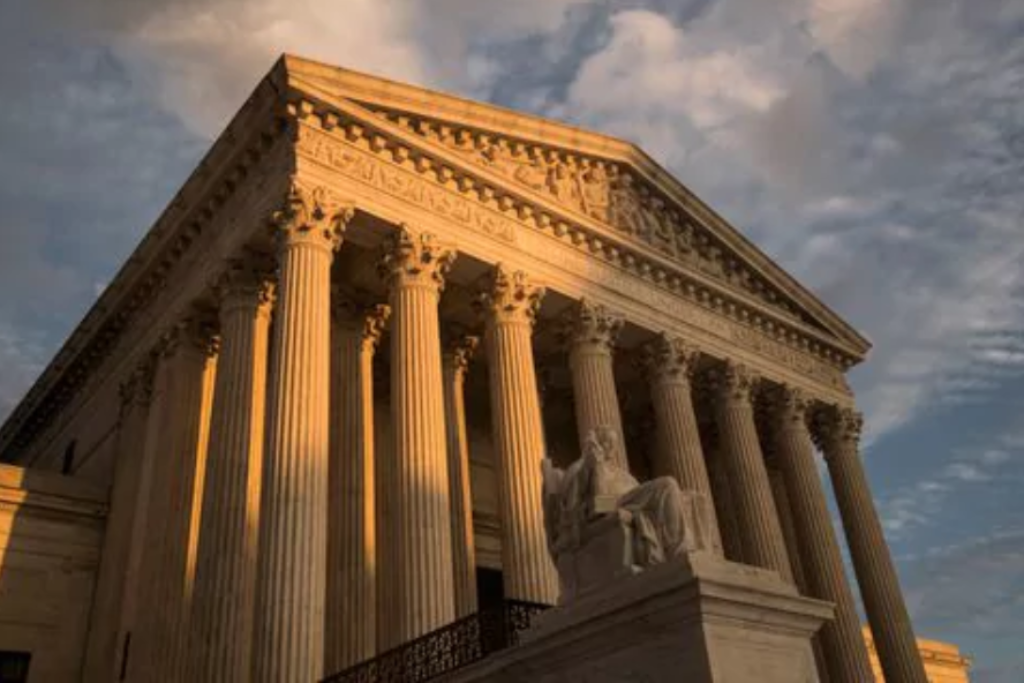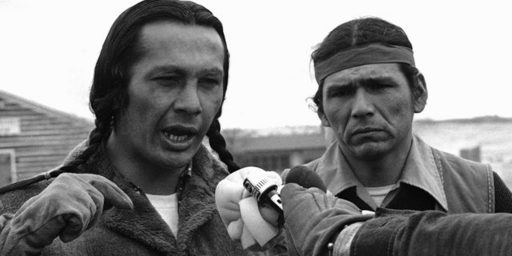Supreme Court To Decide If Nearly Half Of Oklahoma Belongs To Native Americans
Yesterday. the Supreme Court heard argument in a case that makes the argument that nearly half of Oklahoma is actually Native American territory.

On Tuesday, the Supreme Court heard oral argument in a case that on its face is a nothing more than a relatively straightforward murder trial, but it raises a rather intriguing jurisdictional question that could ultimately force the Justices to decide if an area that consists of roughly one-half of the State of Oklahoma is an Indian reservation:
The Supreme Court considered on Tuesday whether much of eastern Oklahoma is an Indian reservation, a question that could have enormous consequences for the area’s 1.8 million residents in matters of criminal justice and commerce.
The argument was made up of equal parts history, much of it dark, and an assessment of the practical implications of a ruling that Congress had never clearly destroyed the sovereignty of the Muscogee (Creek) Nation over the area, covering about half the state.
The case, Carpenter v. Murphy, No. 17-1107, arose from the prosecution in state court of Patrick Murphy, a Creek Indian, for murdering George Jacobs in rural McIntosh County, in east-central Oklahoma.
After he was sentenced to death, it emerged that the murder had taken place on what had, at least at one time, been Indian land. Mr. Murphy argued that only the federal government could prosecute him and that a federal law barred the imposition of the death penalty because he was an Indian.
Lisa S. Blatt, a lawyer for the state, said Congress had long ago destroyed the Creek Nation’s authority over the land in question, meaning that the state prosecution was proper.
She listed ways in which the Creek Nation’s authority had been curtailed by the federal government around the time Oklahoma became a state in 1907, incorporating lands that previously had been officially designated as Indian Territory.
“All tribal courts are abolished,” she said. “All tribal taxes are abolished.”
“Every piece of paper, record, book, dollar bill or coin or property, their buildings, their furniture, their desks — everything was taken away from the tribes,” she added.
Justice Elena Kagan said that was the wrong way to think about tribal sovereignty. “What you’re suggesting,” she told Ms. Blatt, “is that the idea of a reservation is always and necessarily linked to full tribal authority over that land. And that has just never been the case.”
Justice Samuel A. Alito Jr. said that it was a little late to raise the idea that half of Oklahoma is an Indian reservation.
“There’s a fundamental principle of law that derives from Sherlock Holmes, which is the dog that didn’t bark,” he said. “And how can it be that none of this was recognized by anybody or asserted by the Creek Nation, as far as I’m aware, for 100 years?”
Ian H. Gershengorn, a lawyer for Mr. Murphy, said the tribe had continued to exercise sovereignty after Oklahoma became a state. “It abolished tribal offices,” he said. “It created the office of executive interpreter and funded it.”
Chief Justice John G. Roberts Jr. was unimpressed. “That’s the best you’ve got?” he asked. “In terms of the ongoing functioning and relationship, the best example you have of the tribCoe’s continuing authority is hiring an interpreter?”
Other justices were more interested in the consequences of a ruling in Mr. Murphy’s favor. Edwin S. Kneedler, a lawyer for the federal government, arguing in favor of Oklahoma, listed what he said were some of them.
“Any crime involving an Indian as a victim or a perpetrator would be subject to federal jurisdiction, not state jurisdiction,” he said. That would, he said, strain the resources of the F.B.I. and federal prosecutors. The state would not be able to impose taxes on Native Americans, he added, and many other ordinary laws could be affected.
“This would be a dramatic change from the way everyone has understood it for the past 100 years,” Mr. Kneedler said.
Ms. Blatt said a ruling in favor of Mr. Murphy could affect many other convictions.
“There are 2,000 prisoners in state court who committed a crime in the former Indian Territory who self-identify as Native American,” she said. “This number is grossly underinclusive because, if the victim was Native American, the state court also lacked jurisdiction. That’s 155 murderers, 113 rapists and over 200 felons who committed crimes against children.”
In his discussion of the oral argument for SCOTUSBlog, Law Professor Ronald Mann notes that the Justices seemed dubious of the Defendant’s arguments not the least because of the broad-ranging implications of a ruling in his favor:
This morning brought the justices a capital case of a different kind. Carpenter v. Murphy doesn’t raise issues of actual innocence, ineffective assistance of counsel or permissible methods of execution. Rather, it presents the justices with a different kind of question: whether the location in eastern Oklahoma where Patrick Murphy is alleged to have committed murder still lies within the borders of a reservation granted to the Creek Nation when it was forcibly relocated to that territory in the early 19th century. If that area is still a reservation, then Oklahoma had no jurisdiction to try Murphy: The Major Crimes Act would give exclusive jurisdiction over that murder to federal authorities, because Murphy is a Native American. The formal procedures that Congress followed when it organized the state of Oklahoma did not explicitly terminate the reservation on which the crime occurred. Because the Supreme Court’s earlier cases have emphasized the importance of statutory language explicitly terminating a reservation, the lower court concluded that the reservation remains in place.
If the argument tells us anything about the likely outcome of the case, it suggests that several of the justices will balk at the stark implications of moving so much territory – about half of the state of Oklahoma – into reservation status. Justices Samuel Alito and Ruth Bader Ginsburg, for example, repeatedly asked Deputy Solicitor General Edwin Kneedler, arguing as an amicus curiae in support of the Oklahoma authorities responsible for prosecuting Murphy, to remind their fellow justices of the consequences for criminal justice, taxation and regulatory authority of extending a reservation over the eastern half of the state.
Even more pointedly, during the argument of Ian Gershengorn, counsel for Murphy, justices repeatedly offered incredulous comments about the impracticality of recognizing the reservation Murphy envisions. Justice Stephen Breyer, for example, commented:
There are 1.8 million people living in this area. They have built their lives not necessarily on criminal law but on municipal regulations, property law, dog-related law, thousands of details. And now, if we say really this land … belongs to the tribe, what happens to all those people? What happens to all those laws?
In the same vein, Chief Justice John Roberts challenged Gershengorn about the likely disruption to longstanding business arrangements, which now would be brought under tribal control: “What if the tribe decides not to allow the type of business in which you’re engaged, such as alcoholic beverages?”
Alito and Justice Brett Kavanaugh took a slightly different tack, suggesting that the justices should give great weight to historical practice in attempting to assess Congress’ intent in organizing the state of Oklahoma. Alito, for example, called on “a fundamental principle of law that derives from Sherlock Holmes, which is the dog that didn’t bark. And how can it be that none of this was recognized by anybody or asserted by the Creek Nation, as far as I’m aware, for 100 years.” More formally, Kavanaugh suggested that “we have a lot of cases that say historical practice helps inform the text,” and that “the historical practice for a century has been against you.” Continuing, he emphasized that in his view:
[S]tability is a critical value in judicial decision-making, and we would be departing from that and creating a great deal of turmoil. And so why shouldn’t the historical practice, the contemporaneous understanding, the 100 years, all the practical implications say leave well enough alone here?
On one level, the issue before the Justices is a simple one. If the Defendant’s argument is accurate then the State of Oklahoma did not have jurisdiction over him or over the area where the murder took place. If he is to be tried, then that trial would have to take place before a Creek Nation tribal court applying Creek law. If the Court does not accept the Defendant’s argument then his conviction and sentencing under state law was proper and he should be executed pursuant to the sentence that was entered against him. Of course, the issue is not quite that simple, and that’s one of the reasons why this fairly straightforward criminal case has made its way to the Supreme Court of the United States.
Effectively, a ruling in favor of the Defendant would mean that the vast majority of the eastern half of the State of Oklahoma is, in fact, part of the territory granted to the Creek Nation when Oklahoma was still considered “Indian Territory.” If that was the case, then it would put more than a century of property transfers and other actions into doubt, and would likely lead to decades of litigation regarding proper compensation to the Creek Nation for the territory that they lost when the reserved land was taken from them in order to form what eventually became the State of Oklahoma. In no small part, that issue is complicated by a 1984 Supreme Court decision in a case called Solem v. Bartlett 465 U.S. 463 (1984) in which the Justices unanimously ruled that a Native American reservation cannot be legally terminated except via a “clear statement” in legislation passed by Congress and signed into law by the President. This does not appear to have ever occurred with respect to the land granted to the Creek Nation, thus suggesting that, as a matter of law, the reservation was never terminated and still exists today.
Based on the oral argument and the various commentaries that have been posted regarding yesterday’s proceedings, it seems unlikely to me that there is going to be much willingness on the part of the Justices to accept the Defendant’s arguments here for the very reasons that the questions raised by Justices Breyer and Kavanaugh in the questions related above. Ruling for the Defendant here would effectively open the door to issues regarding property rights and other issues and would effectively attempt to undo the business, property, and other arrangements that have taken place in the 128 years since Oklahoma became a territory and the 111 years since it became a state. For that reason alone, I suspect that we’ll see a solid majority ruling against the Defendant here, and perhaps a unanimous ruling in favor of the State of Oklahoma on the jurisdictional issue. But, we’ll have to wait until the decision is handed down to find out for sure.
You can find more information on this case at the Case Information Page at SCOTUSBlog.
Here is the transcript of the oral argument:
Carpenter v. Murphy by on Scribd






Seeing as Native Americans were massively inconvenienced (to put it too mildly) when the Europeans arrived in this continent, it would seem inconveniencing the descendants and descendant institutions of said Europeans in favor of the original inhabitants would only be fair.
Not that I expect it to happen.
Just because it’s been hundreds of years and affects hundreds of people hasn’t stopped congress from giving away square miles of prime Albuquerque to a tribe based on an ambiguity in the 1848 Mexican-American treaty and its implementation in regards to reservations.
@Kathy:
Well, it’s not in favor of the original inhabitants, it’s in favor of generations removed descendants. A rather important difference.
I’m not arguing what was done wasn’t horrible (it was), but just like reparations to African-Americans for slavery, is it right to require people today to pay for the sins of the past? How distant in the past do you go? My family didn’t even immigrate to the US until the 1870’s but should I, a white male of European descent, be liable for somehow making it right for their descendants today? Apologize? Of course. Support civil rights and programs, help with education and healthcare and everything else minorities struggle with in comparison to being born a white male American (and pay the taxes that go along with that)? Absolutely. Tell 1.8 million people that they don’t own their land and property because it belonged to someone else 150 years ago and wasn’t “properly” stolen from the original owners…not so fast.
This is gonna be a bit of legal insider baseball-ism, but I think the doctrine of laches may apply here….
Basically, if you wait too late to complain, you lose. Law of equity thingie. I know it from trademark infringement cases.
“There’s a fundamental principle of law that derives from Sherlock Holmes…”
What???????? Really??????????
Yeah, I know the literary reference, but is Alito’s contention here an actual thing? It strikes me as the most incredible shark jump in the history of the world, but I could be wrong.
@Just Another Ex-Republican:
Yes, but no one will disturb the graves of said descendants’ ancestors.
Irony and jokes aside, there are real issues here. How long does a nation have to assert a claim? Remember the Falklands kerfuffle? And if land was taken irregularly, do the descendants of the dispossessed owners have a claim for compensation? Their lives would have been different had their people owned half of Oklahoma, right? If they do, who owes it to them? One can argue Oklahoma took the territory in good faith, but the Federal Government acted wrongly.
But we know what’s going to happen. This is one case where, partisan leanings aside, the Court will look into law and precedent to keep the Status Quo, well, status quo.
But if this fellow Murphy gets off, he’ll have done so on the mother of all technicalities. and it would change the meaning of Murphy’s Law.
Does seem that for a bunch of originalists, the GOP Justices seem to be arguing everything but the law. Which hardly surprises me, whatever it takes to get the desired outcome.
Honestly…sounds like they’ve already decided and it’s a no.
@just nutha:
I was more struck by the fact that it’s a completely inapposite reference. (The spellchecker at this site knows ‘spellchecker’, but not ‘inapposite’?)
At any rate, anyone who has ever had to pay for a title search when buying a house has no sympathy whatever for the “…but that was a long time ago and people have been living their lives as if” argument.
@DrDaveT: Yes, but there is this thing about filing to “quiet title” when the situation is totally lost in the realms of history.
Also don’t forget about things like adverse possession, which could potentially apply here, no? It would be a mess, because individual land-dwellers would have to claim it. And then of course the other side could argue that there ain’t so such thing under Amerindian custom/law….could provide lotsa employment for a lot of lawyers!
Maybe this is what Trump means when he says he’s going to create jobs?
For sheer beer drinking, popcorn chomping entertainment value, I hope the supremes declare half of Oklahoma the Rez, but alas it won’t happen.
@DrDaveT: Inapposite was the term I was looking for. Thanks! I’d be amazed if someone has actually used Sherlock Holmes as a legal reference for a precedent. WA!
ETA: “Maybe this is what Trump means when he says he’s going to create jobs?” At least these jobs will be paying decent wages. Most of the time conservatives are replacing $40/hr. jobs with $5/hr. ones. Nice to see the trend reverse for a change.
You know, the whole problem with the “my ancestors got here in [whatever year] and so this historical atrocity isn’t on my shoulders” argument is that by extension the only people who should celebrate the Fourth of July are those whose ancestors were on American soil in 1776. Once you’re here, you’re all in on America’s problems, triumphs, joys and sorrows. This ain’t a dim sum restaurant – you don’t get to pick and choose.
Fascinating! Do carry on …
Tribes will not be able to reclaim land allotted under the Dawes Rolls. Some tribal members sold their allottments prefering to reside in more populated areas.